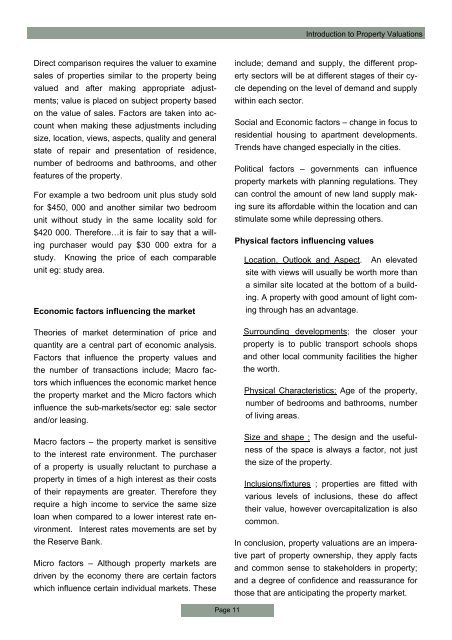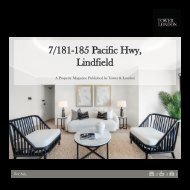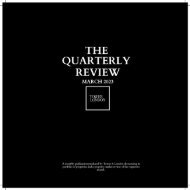You also want an ePaper? Increase the reach of your titles
YUMPU automatically turns print PDFs into web optimized ePapers that Google loves.
Introduction to Property Valuations<br />
Direct comparison requires the valuer to examine<br />
sales of properties similar to the property being<br />
valued and after making appropriate adjustments;<br />
value is placed on subject property based<br />
on the value of sales. Factors are taken into account<br />
when making these adjustments including<br />
size, location, views, aspects, quality and general<br />
state of repair and presentation of residence,<br />
number of bedrooms and bathrooms, and other<br />
features of the property.<br />
For example a two bedroom unit plus study sold<br />
for $450, 000 and another similar two bedroom<br />
unit without study in the same locality sold for<br />
$420 000. Therefore…it is fair to say that a willing<br />
purchaser would pay $30 000 extra for a<br />
study. Knowing the price of each comparable<br />
unit eg: study area.<br />
Economic factors influencing the market<br />
Theories of market determination of price and<br />
quantity are a central part of economic analysis.<br />
Factors that influence the property values and<br />
the number of transactions include; Macro factors<br />
which influences the economic market hence<br />
the property market and the Micro factors which<br />
influence the sub-markets/sector eg: sale sector<br />
and/or leasing.<br />
Macro factors – the property market is sensitive<br />
to the interest rate environment. The purchaser<br />
of a property is usually reluctant to purchase a<br />
property in times of a high interest as their costs<br />
of their repayments are greater. Therefore they<br />
require a high income to service the same size<br />
loan when compared to a lower interest rate environment.<br />
Interest rates movements are set by<br />
the Reserve Bank.<br />
Micro factors – Although property markets are<br />
driven by the economy there are certain factors<br />
which influence certain individual markets. These<br />
include; demand and supply, the different property<br />
sectors will be at different stages of their cycle<br />
depending on the level of demand and supply<br />
within each sector.<br />
Social and Economic factors – change in focus to<br />
residential housing to apartment developments.<br />
Trends have changed especially in the cities.<br />
Political factors – governments can influence<br />
property markets with planning regulations. They<br />
can control the amount of new land supply making<br />
sure its affordable within the location and can<br />
stimulate some while depressing others.<br />
Physical factors influencing values<br />
Location, Outlook and Aspect. An elevated<br />
site with views will usually be worth more than<br />
a similar site located at the bottom of a building.<br />
A property with good amount of light coming<br />
through has an advantage.<br />
Surrounding developments; the closer your<br />
property is to public transport schools shops<br />
and other local community facilities the higher<br />
the worth.<br />
Physical Characteristics; Age of the property,<br />
number of bedrooms and bathrooms, number<br />
of living areas.<br />
Size and shape ; The design and the usefulness<br />
of the space is always a factor, not just<br />
the size of the property.<br />
Inclusions/fixtures ; properties are fitted with<br />
various levels of inclusions, these do affect<br />
their value, however overcapitalization is also<br />
common.<br />
In conclusion, property valuations are an imperative<br />
part of property ownership, they apply facts<br />
and common sense to stakeholders in property;<br />
and a degree of confidence and reassurance for<br />
those that are anticipating the property market.<br />
Page 11


















